Interview with Alison Carey & UNIVERSES by Quita Sullivan
One of the important pieces of learning from the National Theater Pilot has been the role of developmental partners on the shape and success of productions. Quita Sullivan (NEFA’s National Theater Project Manager) had a brief phone conversation with Oregon Shakespeare Festival’s Alison Carey (Director, American Revolutions: The United States History Cycle) and members of UNIVERSES (Mildred Ruiz-Sapp, Steven Sapp, and William Ruiz, aka Ninja) before a performance of UNIVERSES’ Party People to discuss their collaboration.
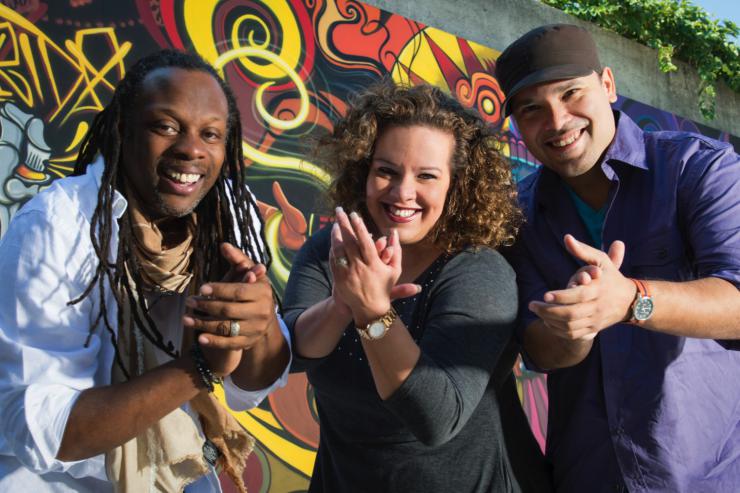
NEFA: How did this collaboration between OSF and UNIVERSES on Party People come about?
ALISON: I’ve known what UNIVERSES has done for years and years and it’s fantastic work, so that was sort of the starting point. I was lucky enough to go see Ameriville at the Humana Festival, and it was one of those great experiences where I sat in the theatre watching the show and I stood up after the show and I walked outside and called Bill (Rauch, OSF Artistic Director) and said I want to commission them. He said great, and I went back into the theatre and I said, “Hey, I’m Alison Carey, can we talk?” And the rest is history, at least from my perspective.
STEVEN: Yes, that’s definitely what happened.
NEFA: So you didn’t know Alison was in the audience and were totally surprised by this?
STEVEN: I was! When Bill first took the job at OSF, he called me in New York and had me in a meeting in the back of a restaurant like the Godfather. Bill told me that he was taking this job and that he would come for us when he could figure something out. And I was like, “Okay, whenever you figure that out.” So when Alison came, I really didn’t connect the two until she walked away. And I thought, “Wait! Did Bill send her?”
When you’re trying to create an impressionistic vision of the United States over thirty-seven plays, notions of not having UNIVERSES’ voice, perspective, thought, and beauty in that vision were inconceivable.
ALISON: I had never seen UNIVERSES’ work before. I think in Ameriville and their other work there is something very specific about the way UNIVERSES talks about the United States. When you’re trying to create an impressionistic vision of the United States over thirty-seven plays, notions of not having UNIVERSES’ voice, perspective, thought, and beauty in that vision were inconceivable. There was never a moment of doubt in my mind from the first few minutes of that show that this was something that we desperately needed for this program. And we were lucky enough to get it. That was in March 2010. One of the things about American Revolutions is that we let the artists choose what they want to write. There’s no one at OSF saying, “This is what’s important to write about and we don’t care about anything else.” And I remember Steven calling me and saying, “We have this idea.” And—what was that idea, Steven?
STEVEN: The idea was about the Black Panthers and the Young Lords. We were honest with ourselves about what was important, and that was what we came up with. We didn’t know if they would say yes, but that was what we came up with.
ALISON: Yeah, because you didn’t believe that we meant that you could actually do whatever you wanted.
STEVEN: No, we didn’t. So we were kind of throwing it out there, expecting to get a “no” and figuring out how to double back. So, when Alison said yes, it was “oh!”
ALISON: We wouldn’t have said no in any case, but obviously the thought just in terms of recapturing stories that maybe have been lost or are myth or subject to manipulation over time—this was a dynamic and particular story, and then knowing what UNIVERSES’ personal connection with those groups was and is and the opportunity for them to actually speak to the people who actually made the history—you know that’s been an incredibly exciting, historically significant and delightful thing.
NEFA: OSF and UNIVERSES have very different and unique working styles. What were the most difficult and the easiest adjustments in your collaboration?
STEVEN: For us, the easiest thing is that we try to get along with everyone. (Laughter) OSF was so open in terms of what we do and how we do it and that made it easier. The hardest part came when we actually had to have a script, because we don’t write scripts that way. Meeting deadlines for scripts was like, “Oh jeez,” because to us, it’s never finished and we didn’t want to send in something that was going to change or that we felt wasn’t up to snuff. Then, Alison was prodding, “Just send it, just send it, just send it!” And then we would send it, grudgingly. We thought, “They’re going to think it sucks and we suck. This sucks!” That was hard, but once we stopped caring about it so much, it actually became much easier.
ALISON: I think a lot of that was because we had an initial conversation about UNIVERSES' work method. Some of it was just a matter of vocabulary. So I don’t think we were completely clear that UNIVERSES was going to be suffering when we were asking for scripts. In retrospect, if there was something that we were suffering from it was that none of us knew what we didn’t know. Everyone was doing their best and sometimes, literally, we would say words and they would have different meanings. At the same time, given the possibilities for major miscommunications, I don’t think that happened. I also think it would have been harder if you were doing three weeks of eight hour days. OSF naturally has a rehearsal process where you rehearse five hours one day and three hours the next day. There was time for UNIVERSES to go home and think and process a little more. Obviously, we could have had a million more years, but that’s always true of any theatrical project. And so, as we began to learn more about the process, it was exciting to learn that our way of working could hold and support UNIVERSES in what they were doing.
NEFA: How did the relationship between UNIVERSES and OSF change over the course of the project?
MILDRED: We were able to learn how to play on our strengths. The relationship became more collaborative in the production aspects, in trying to figure out what the goal was as far as touring (even after the OSF show), and figuring out who we need to talk to in order to get our tour up and running.
ALISON: One of the challenges of working in Oregon is that you are not hanging out in NYC where you can encounter people easily. We have a beautiful community of artists here, but it’s isolated. UNIVERSES was able to make time in their schedule and come be here and hang out with the company, so that our understanding and appreciation for their aesthetic could only grow. We actually came to know each other, and even our kids hang out. That may sound trivial, but I think we all know that theatre is a relationship-based business. There are good things and bad things about that, but that we spend holidays together is cool. It takes the edge off. For a self-producing ensemble like UNIVERSES and a big self-producing theatre like OSF, the potential for “but this is the way it’s done!” when you’re in a “business-only” relationship is very high. We were able to defuse some of that. We just spent a lot of time together.
UNIVERSES was able to make time in their schedule and come be here and hang out with the company, so that our understanding and appreciation for their aesthetic could only grow. We actually came to know each other, and even our kids hang out.
STEVEN: It feels nice when you’re actually with people that you actually like as people and can have a conversation with when things get bumpy and rocky. You don’t necessarily take it personally or think they are out to get you. So, that helps, especially when you are dealing with a huge organization. We’ve dealt with big organizations before, and sometimes you just don’t know people. Or it’s just business—you’re just there to do your eight hours and then you go home. Even as we are creating a new piece of work, here at OSF, about 99% of the time everyone understood what the hell we were doing and those who didn’t learned.
NEFA: Party People received a New England Foundation for the Arts National Theater Pilot grant for development and for the touring of Party People. UNIVERSES tours quite a bit, but OSF productions don’t usually tour. Has this affected the partnership and how you created and produced Party People?
ALISON: It’s true that OSF has sometimes toured shows; it’s part of our Artistic Director’s aesthetic to get more work out there. So, it’s kind of perfect for us and the American Revolutions plays that have been produced so far. It’s perfect timing for OSF as we are trying to expand the ways we have conversation in the larger field and to know that we are supporting artists who are doing this work and will bring it to a lot of places. We don’t have an agenda. We are here to support and we are proud to have our name out there anywhere they might perform.
MILDRED: When we began our conversation with OSF, we knew that some of the previous shows from the American Revolutions series had already toured. It was part of Alison’s bulletin board already, and we saw possible places that might be interested in a show like this. OSF, from those initial conversations, gave us the feeling that they understood that we are a touring company. That’s how we live, right? Most of our living is through touring. They were also always part of the conversation of what happens after OSF. They knew that from the beginning, it is always UNIVERSES’ intention that different communities around the country will see the work. Then it was a matter of creating the work. Other regional theatres were trying to limit our thought process to lead towards something that would be more tourable. “Think about having a smaller cast. Think about a tourable set.” All these ideas were coming from other theatres about how we could make it tourable—but we weren’t getting that from OSF. We didn’t allow that to get in the way of creating. We didn’t say, “Okay, let’s shrink it down to four actors. Let’s create it and dream and then shrink it down.” This is probably why we’ve had such a hard time getting people to come on board with the show—they see twelve actors and then they stop.
NEFA: What have you learned from this partnership? What would you like to share about this model?
ALISON: It’s the thing you learn every time, which is don’t make assumptions. It’s important to ask really stupid questions that you think you know the answer to and make everything explicit. Not because it’s better (in art, it’s really great to be surprised), but sometimes when you are creating art, it’s better to be really clear in the beginning about everything. That’s true about everything in life. Also important is knowing there are certain things that are unknowable and you will only learn as they happen. And that’s the glory of it.
STEVEN: The company’s infrastructure, how we do things, and the partnerships we have—these all have to remain in partnership with a larger organization. You are being presented or produced and everyone is there for you, but you also have to make sure that it is a partnership and you’re not waiting for the theatre to move or make something happen. We’re working together to make something happen. We always have done that, but this reinforced really being proactive in dealings with a larger organization.
It was helpful to know that this is American Revolutions and, even though it’s a program of OSF, it’s what is focusing on us and working on our behalf, on behalf of the work we’re creating and on behalf of the communities that we are trying to bring in as an audience.
MILDRED: One of the things that helped us here at OSF (you know OSF is a monster machine, right?) is the fact that we were part of American Revolutions. It brought things down to a more manageable scale. We knew who was housing us. It’s like living in a giant complex, but you know where your apartment is. Understanding that the larger regional theatre might have other things in mind that aren’t necessarily related to what you’re doing. You’re just not part of the conversation because they have different things to do. But, when you find that apartment—that place where you can move around in—then you can open doors from there. If we had come into the organization another way, it might have been more complicated to try to figure our way around. It was helpful to know that this is American Revolutions and, even though it’s a program of OSF, it’s what is focusing on us and working on our behalf, on behalf of the work we’re creating and on behalf of the communities that we are trying to bring in as an audience.
ALISON: There is a lot of stuff that OSF doesn’t do because there aren’t enough hours in the day. But this collaboration allowed us to do different things. Steven and Mildred and Ninja have these relationships with the Black Panthers and the Young Lords that we just don’t have. OSF wasn’t going to call these people. Having UNIVERSES here made things possible. Insofar as we were able to support their ideas about ancillary programing, it was incredibly helpful and it’s stuff we wouldn’t have done on our own. Sometimes, because there is so much going on in big organizations, it’s easy to forget possibility. But one thing about collaboration is that it’s easy to see the possibilities of the world.
At this point, UNIVERSES had to head out for the world of wig and flamenco calls for their evening performance of Party People.
Quita Sullivan is the Program Manager for New England Foundation for the Arts (NEFA) National Theater Project. She holds a BA and MA in Theatre from Knox College and SUNY Stony Brook, respectively, as well as a law degree from Wayne State University Law School. Before law school, she worked as a Stage Manager in Chicago and later as an Administrative Assistant for a not-for-profit artist management office, creating contracts and managing booking and performing fees for musicians in the Great Lakes area. After law school, she practiced Environmental Justice law for ten years in Detroit and Boston. Prior to joining NEFA as a staff member, Quita was an Advisor for NEFA’s Native Arts Program. Quita is Of Counsel to and a member of the Montaukett tribe.

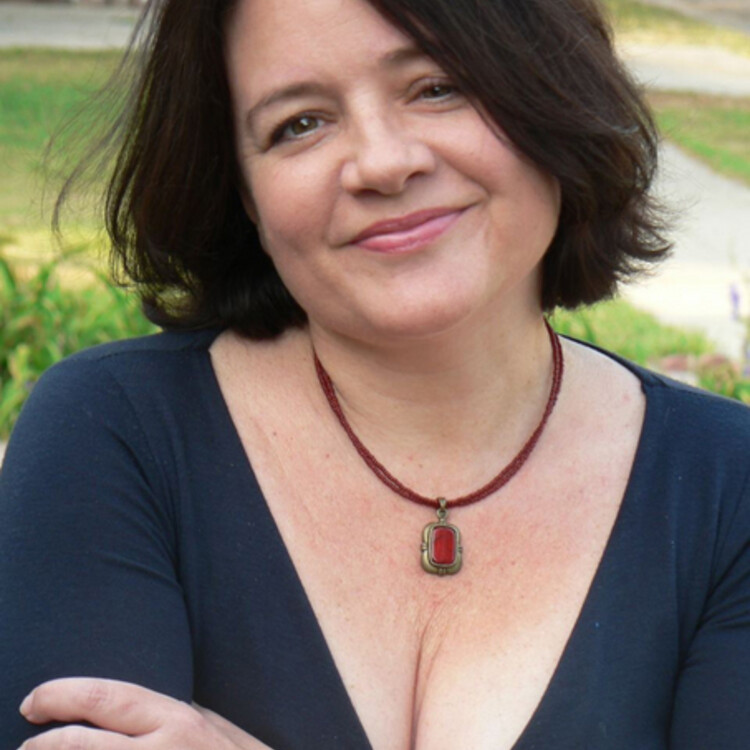

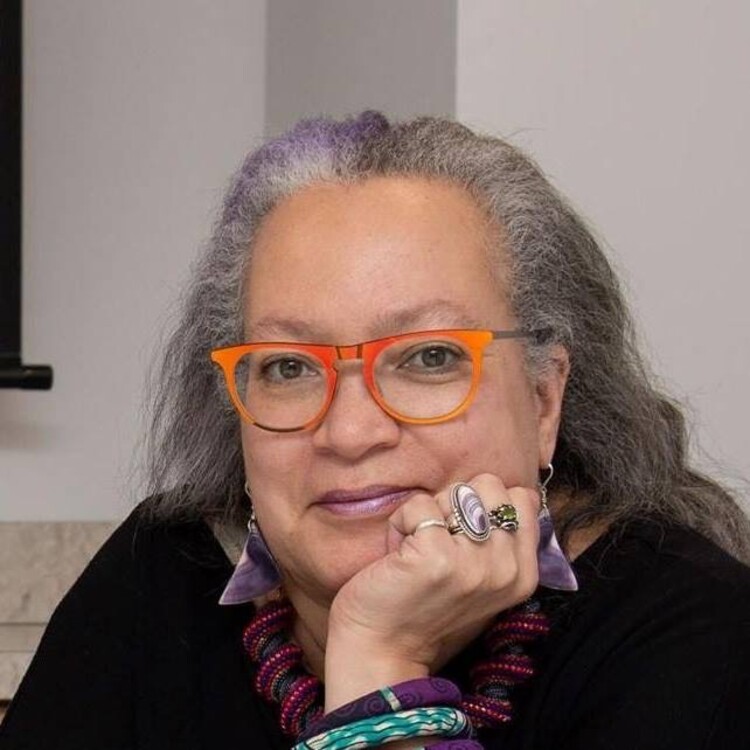
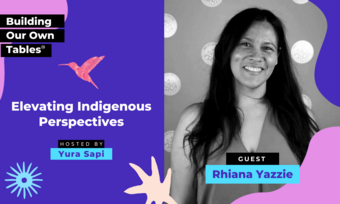


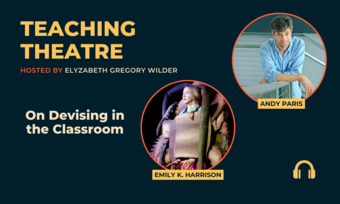



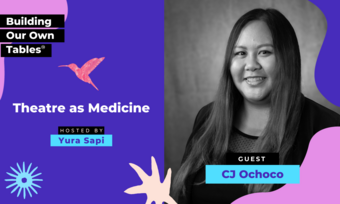

Comments
The article is just the start of the conversation—we want to know what you think about this subject, too! HowlRound is a space for knowledge-sharing, and we welcome spirited, thoughtful, and on-topic dialogue. Find our full comments policy here